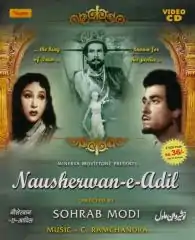| Nausherwan-E-Adil | |
|---|---|
 | |
| Directed by | Sohrab Modi |
| Written by | Shams Lucknowi |
| Screenplay by | Shams Lucknowi |
| Story by | Shams Lucknowi |
| Produced by | Minerva Movietone |
| Starring | Sohrab Modi Raaj Kumar Mala Sinha |
| Cinematography | Lateef Bhandare |
| Edited by | P. Bhalchandra |
| Music by | C. Ramchandra |
Production company | Minerva Movietone |
| Distributed by | Minerva Movietone |
Release date | 1957 |
Running time | 137 minutes |
| Country | India |
| Language | Hindi |
Nausherwan-E-Adil (transl. Nausherwan, the just) also called Farz Aur Mohabbat, is a 1957 Indian costume action drama Hindi/Urdu film directed by Sohrab Modi.[1] Produced by Minerva Movietone, it had music composed by C. Ramchandra with lyrics by Parwaiz Shamshi.[2] The story, screenplay and dialogue writer was Shams Lucknowi. The cinematographer was Lateef Bhandare. The cast included Sohrab Modi, Raaj Kumar, Mala Sinha, Naseem Banu, Bipin Gupta and Shammi.[3]
The story is about an unbiased ruler, Nausherwan-E-Adil (Sohrab Modi), whose fair sense of justice brings about tragedy in his personal life involving his wife and son. The theme had some resemblance to Modi's earlier success Pukar (1939).[4]
Plot
Sultan-e-Iran (Emperor of Iran) is a just ruler and known as such, Nausherwane-e-Adil (Nausherwan The Just) (Sohrab Modi). His laws are equal for everyone and he follows them in his dispensation of justice. However, when questioned about a certain ruling, by a Christian priest David (Bipin Gupta), he realises that the laws he is following have come down through ages without being written down. He decides to rectify this and gets his Wazir (Niranjan Sharma) to start work on it. Nausherwan now decides to go incognito into his country to see for himself whether his people are content and happy. When he returns, he sets about bringing reformation into the laws with the help of his judiciary. He puts forth two laws; anyone deceiving a girl will be walled up, and anyone betraying the state will be put to death.
Nausherwan and his wife (Naseem Banu) have two sons, Naushahzad (Raaj Kumar) and Hormuz. He declares his older son Naushahzad as heir to the throne. Naushahzad saves a young girl when he fishes her out of the water with the help of his friend, Altaf (Agha). They take her to the priest David where it's discovered that she's his long-lost daughter, Marcia (Mala Sinha). Naushazad says he's a Christian named Joseph. Soon, Marcia and "Joseph" fall in love.
Joseph declares to his mother (who's also a Christian) that he's a Christian, but she asks him to keep it hidden from his father as only an Iranian (Zoroastrian) can become king. Complications arise and Nausherwan is tested when David and Marcia come to him demanding justice as they feel Naushahzad, as Joseph, has deceived them. When Nausherwan pronounces judgement as set down by his laws, Naushahzad revolts and is fought off by the Commander (Murad), who wounds him critically. Marcia kills herself with a dagger. Nausherwan renounces his kingdom and appoints his younger son Hormuz as the new ruler.
Cast
- Sohrab Modi as Sultan-E-Iran Nausherwan-E-Adil
- Raaj Kumar as Shehzada Naushazad / Joseph
- Mala Sinha as Marcia
- Naseem Banu as Malika-E-Iran
- Bipin Gupta as Hakim David
- Murad as Ram Wazir
- Agha as Altaf
- Shammi as Altaf's Wife
- Niranjan Sharma as Wazir-E-Ala
Soundtrack
The film had music direction by C. Ramchandra and the lyricist was the poet Parvaiz Shamsi. The playback singers were Lata Mangeshkar, Mohammed Rafi, Asha Bhosle, Zohrabai Ambalewali and Chandbala.[5] The film had some popular songs including the ghazal written by Parvaiz Shamsi; "Yeh Hasrat Thi Ki Is Duniya Mein Bas Do Kaam Kar Jaate", sung by Mohammed Rafi for Raaj Kumar.[6]
Song list
| Song | Singer |
|---|---|
| "Bheeni Bheeni Hai" | Lata Mangeshkar |
| "Raat Dhali, Jaan Chali" | Lata Mangeshkar |
| "Matlab Ki Yeh Duniya Hai" | Lata Mangeshkar |
| "Taron Ki Zuban Par Hai Mohabbat Ki Kahani" | Lata Mangeshkar, Mohammed Rafi |
| "Bhool Jayen Sare Gham, Doob Jayen Pyar Mein" | Lata Mangeshkar, Mohammed Rafi |
| "Yeh Hasrat Thi Ke" | Mohammed Rafi |
| "Yeh Nazaqat, Yeh Aalam" | Asha Bhosle |
| "Mere Dard-E-Jigar Ki Har Dhadkan Manzil Ka Pata Batlati Hai" | Asha Bhosle, Zohrabai Ambalewali, Chandbala |
| "Khushamad Ka Hai" | C. Ramchandra |
Trivia
Raaj Kumar was unable to make his mark following this film, even though he was cast as a hero opposite Mala Sinha.[7]
Further reading
- Rahman, Anisur. "Nausherwan". Rekhta Foundation.
References
- ↑ "Cast and crew Nausherwan-E-Adil". Gomolo.com. Retrieved 15 December 2014.
- ↑ "Nausherwan-E-Adil". Indiancine.ma Wiki. Retrieved 15 December 2014.
- ↑ "Nausherwan-E-Adil". Alan Goble. Retrieved 15 December 2014.
- ↑ Bhagwan Das Garga (1996). So many cinemas: the motion picture in India. Eminence Designs. ISBN 978-81-900602-1-9. Retrieved 15 December 2014.
- ↑ "Songs Nausherwan-e-Adil". Hindi Geetmala. Retrieved 15 December 2014.
- ↑ Raju Bharatan (1 September 2010). A Journey Down Melody Lane. Hay House, Inc. pp. 119–. ISBN 978-93-81398-05-0. Retrieved 15 December 2014.
- ↑ The Illustrated Weekly of India. October 1970. Retrieved 15 December 2014.
External links
- Nausherwan-E-Adil at IMDb
- Songs Muvyz, Inc.
- Liddle, Madhulika (11 November 2012). "Nausherwan-e-Adil (1957)". Dustedoff.